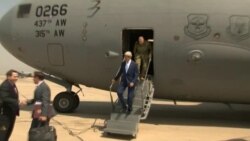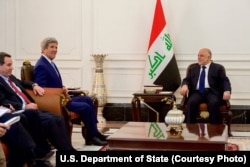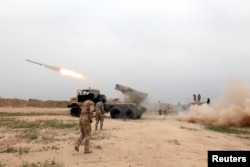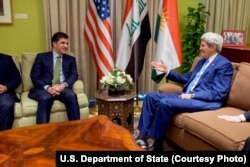Islamic State extremists are losing ground in Iraq, their leaders and fighters are being eliminated and the group's rank-and-file members are losing hope, U.S. Secretary of State John Kerry said Friday.
Kerry made a quick visit to Baghdad Friday for talks with Iraqi leaders. He promised the U.S.-led coalition fighting Islamic State "will work with Iraq to turn up the pressure even further” during the coming weeks and months.
The top U.S. diplomat underscored continued American support for the Iraqi government in its efforts to strengthen security and work toward stability in politics and economic development.
Kerry flew to Baghdad from Bahrain for his first visit to the Iraqi capital since 2014. He met with Prime Minister Haider al-Abadi and the Kurdistan regional government's prime minister, Nechrivan Barzani, before appearing before reporters at a news conference.
Listing recent gains against extremists in Iraq, Kerry said Islamic State “fighters have not been on the offensive in months,” and have lost more than 40 percent of the territory they once controlled.
U.S-led coalition airstrikes have targeted IS leaders and disrupted the jihadist group’s cash flow, Kerry said, adding that IS is “losing ground, losing fighters and losing cash."
Kerry said Iraqi forces are laying the groundwork for a major effort to retake Mosul, in northern Iraq, which fell to Islamic State militants in 2014. There are indications the United States is lending additional support to the Iraqis' assault on the strategically important city.
Kerry said the Mosul operation is underway and still evolving. Pentagon officials said earlier this week that a coalition airstrike destroyed an IS headquarters complex in Mosul that formerly had been a Turkish consulate.
There are currently about 3,870 U.S. forces in Iraq.
Kerry said there were no specific Iraqi requests for additional American troops, although reports in the United States say such a proposal may soon be put forward by the Pentagon.
U.S. Joint Chiefs Chairman General Joseph Dunford and Defense Secretary Ash Carter are expected to request more U.S. troops to fight Islamic State militants, and White House spokesman Josh Earnest has said President Barack Obama would give such a recommendation "careful consideration."
U.S. military officials have said only that they are establishing an additional military outpost in the area around Mosul.
Rear Admiral Andrew Lewis, vice director of joint staff operations at the Pentagon, has said "there may be a situation in which there is another base that is opened or reopened from years past that would be used ... as a fire support base behind the front lines."
Kerry also announced the U.S. will provide nearly $155 million in additional humanitarian assistance to help displaced Iraqis, bringing total U.S. spending on the humanitarian effort in Iraq to nearly $780 million since late in 2013.
Kerry's trip to Baghdad came at a time when Prime Minister Abadi has been grappling with political turmoil. He proposed a Cabinet reshuffle last month as an anti-corruption move, following weeks of protests by supporters of Shi'ite cleric Muqtada al-Sadr.
"This is obviously a very critical time here in Iraq," Kerry commented before beginning a meeting with Iraqi Foreign Minister Ibrahim al-Eshaiker al-Jaafari.
The U.S. secretary said Washington has no role in Iraq's internal politics, but “what we did indicate [to Abadi] is, it is important to have political stability."
“It is important to have a functioning government so that all of these operations are not affected, so that we give confidence to the coalition and the communities that have been liberated,” he added.
Kerry is on a weeklong tour of the Middle East and Asia that will include a visit to Hiroshima, Japan, for a Group of Seven (G-7) summit.
WATCH: Related U.S.-led coalition strike on Islamic State militants near Hit, Iraq








